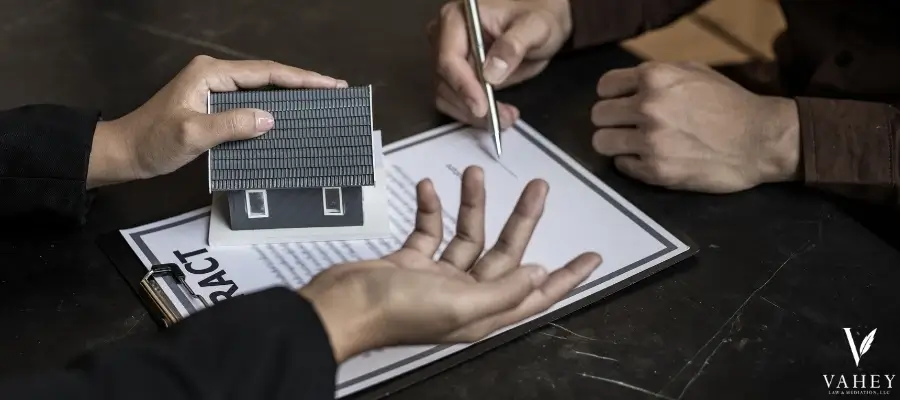Going through a divorce can be financially and emotionally tumultuous. Dividing property between partners is one of the most challenging elements of the divorce process. In Illinois, distributing assets and debts, including family homes, retirement accounts, and personal belongings, requires legal assistance and understanding. A Bolingbrook property division lawyer can help you understand your rights and options.

Vahey Law & Mediation, LLC takes pride in delivering customized legal solutions to meet each client's individual needs. We provide innovative and strategic legal guidance while responding effectively to your needs throughout your legal journey. Our extensive experience allows us to represent your interests in all legal situations, whether inside or outside the courtroom.
With the median household income in 2023 at $107,552 and the median home value at $295,500, property division in Bolingbrook comes with large financial stakes.
Illinois operates under a different legal framework than community property states regarding asset division. In Bolingbrook, property division cases are typically handled in the Will County or DuPage County court system, where judges follow Illinois' equitable distribution principles.
Illinois applies the legal principle of "equitable distribution" to divide property during high asset divorce proceedings. A judge can distribute marital assets and debts in divorce cases without splitting property down the middle.
The distribution of property occurs according to fairness, taking into account each couple's unique circumstances. For example, the court may rule in favor of one spouse receiving the marital home while the other receives more of the retirement savings.
In Bolingbrook, couples who are seeking a divorce typically attend divorce proceedings at the Bolingbrook Branch Court, located at 375 West Briarcliff Road, Bolingbrook, IL 60440. Other cases proceed at the Will County Courthouse in Joliet. People can find both emotional and legal support through Woodson Counseling & Consulting Services and DivorceCare support groups in Naperville during the divorce process.
In Illinois, the divorce rate in 2022 was 1.1 per 1,000 people, which signifies a notable decline from previous years. This was lower than the national average, which was about 2.4 per 1,000 population, according to the CDC. While it appears that divorce rates are declining due to the higher median income in Bolingbrook, property division assistance still stands as a prevalent need.
Before property can be divided, all property must be categorized as either marital or separate property. Separate property includes items acquired from one spouse either before the marriage, as a gift, or through an inheritance. This also includes property obtained after the couple legally separated.
Marital property consists of assets that spouses obtain while they are married. It encompasses both assets and debts that occurred throughout the marriage. All property obtained during the marriage is automatically assumed to belong to both spouses unless evidence shows it must remain separate property.
Marital property includes assets such as real estate, bank accounts, pension funds, and retirement accounts. Assets that appear to belong to one spouse alone, such as a house titled solely in their name, may be classified as marital property when acquired during the marriage.
In some cases, separate property can become marital property, such as in instances when commingling occurs. An example would be if one spouse opened a bank account prior to marriage, but both spouses deposited and withdrew funds from it throughout the marriage. Another example would be if the property was transferred to another spouse’s name after the marriage, such as adding their name to the title of the house.
When dividing property in Bolingbrook, Illinois, judges consider many factors to determine what the greatest course of action would be to facilitate an equitable distribution. Some things they consider include:
Illinois is a no-fault divorce state. Marital misconduct, including infidelity, does not affect property division except when it leads to dissipation of assets.
A: The assets that cannot be touched in a divorce are “separate property.” In Illinois divorce proceedings, separate property assets like pre-marital property and individually received inheritances or gifts usually remain with one spouse. Separate property that becomes mingled with marital property or transformed into marital property becomes eligible for division.
A: No, a wife is not automatically entitled to half your business if you divorce in Illinois. A business obtained during marriage in Illinois typically falls under marital property classification, which allows for division during divorce proceedings. The worth of the business can be determined by several elements, which allows a judge to assign part of it to your wife, yet this doesn’t guarantee she will receive half the value.
A: Property lawyers are typically known as family law attorneys or divorce attorneys when they handle property division in divorce cases. Attorneys who focus on certain business valuations or real estate transactions might be known as property division attorneys or real estate attorneys, depending on their specific area of legal work.
A: Illinois law does not enforce a minimum marriage length requirement to claim half of the marital property. The court determines a fair distribution of property through equitable distribution, which considers marriage duration and individual contributions instead of splitting assets equally. Even if one spouse did not contribute financially, the court will consider other contributions, such as child-rearing or homemaking.
If you’re facing a divorce and have property division issues to work through, an attorney at Vahey Law & Mediation, LLC can help you. We can help you fight for equitable distribution. Contact us today for more information.